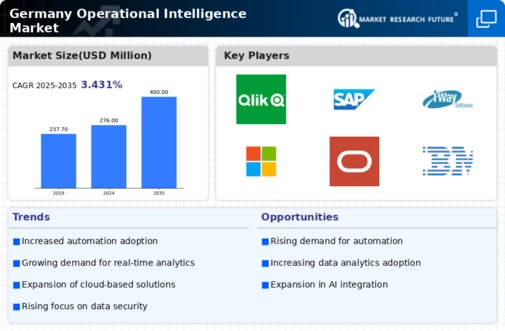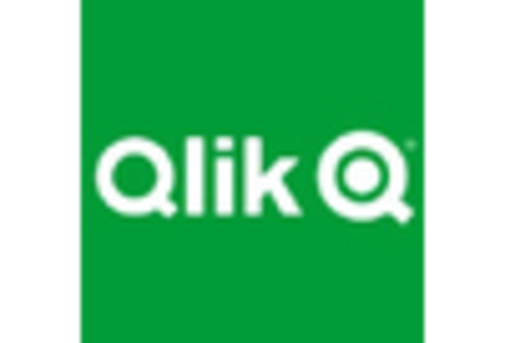Cloud Adoption and Scalability
Cloud adoption is transforming the Germany operational intelligence market by providing scalable solutions that enhance operational capabilities. The shift towards cloud-based platforms allows organizations to access advanced operational intelligence tools without the burden of extensive infrastructure investments. This trend is particularly relevant in Germany, where businesses are increasingly seeking flexible solutions that can adapt to changing demands. According to market data, the cloud services market in Germany is expected to grow by 15% annually, driving the adoption of cloud-based operational intelligence solutions. As organizations embrace cloud technology, the operational intelligence market is likely to witness a surge in demand for scalable, cost-effective solutions that facilitate collaboration and data sharing across teams.
Integration of Advanced Analytics
The integration of advanced analytics into the Germany operational intelligence market is becoming increasingly prevalent. Organizations are leveraging sophisticated analytical tools to derive actionable insights from vast datasets. This trend is driven by the need for enhanced decision-making capabilities and operational efficiency. According to recent data, the market for advanced analytics in Germany is projected to grow at a compound annual growth rate of 12% over the next five years. Companies are investing in analytics platforms that enable predictive modeling and scenario analysis, which are essential for navigating complex business environments. As a result, the operational intelligence market in Germany is witnessing a shift towards data-driven strategies, allowing businesses to optimize their operations and improve overall performance.
Demand for Real-Time Decision Making
The demand for real-time decision-making capabilities is a significant driver in the Germany operational intelligence market. Organizations are increasingly recognizing the value of timely insights in maintaining a competitive edge. The ability to analyze data in real-time allows businesses to respond swiftly to market changes and operational challenges. Recent studies indicate that companies utilizing real-time analytics experience a 20% improvement in operational efficiency. This trend is prompting investments in technologies that support real-time data processing and visualization. As a result, the operational intelligence market in Germany is evolving to accommodate solutions that provide instantaneous insights, enabling organizations to make informed decisions rapidly and effectively.
Focus on Enhanced Cybersecurity Measures
The focus on enhanced cybersecurity measures is a crucial driver in the Germany operational intelligence market. As cyber threats become more sophisticated, organizations are prioritizing the protection of their operational data. This trend is leading to increased investments in cybersecurity solutions that integrate with operational intelligence systems. Recent reports suggest that the cybersecurity market in Germany is projected to grow by 10% annually, reflecting the urgency of addressing security vulnerabilities. Companies are seeking operational intelligence tools that not only provide insights but also incorporate robust security features to safeguard sensitive information. Consequently, the operational intelligence market in Germany is evolving to meet the dual demands of operational efficiency and cybersecurity, ensuring that organizations can operate securely in an increasingly digital landscape.
Regulatory Compliance and Data Governance
Regulatory compliance and data governance are critical drivers in the Germany operational intelligence market. With stringent regulations such as the General Data Protection Regulation (GDPR), organizations are compelled to adopt robust data governance frameworks. This necessity has led to increased investments in operational intelligence solutions that ensure compliance while maximizing data utility. The market is witnessing a surge in demand for tools that facilitate data lineage, auditing, and reporting capabilities. As companies strive to maintain compliance, the operational intelligence market in Germany is expected to expand, with a focus on solutions that integrate compliance features seamlessly into business processes. This trend not only mitigates risks but also enhances trust among stakeholders, thereby fostering a more resilient operational environment.
















